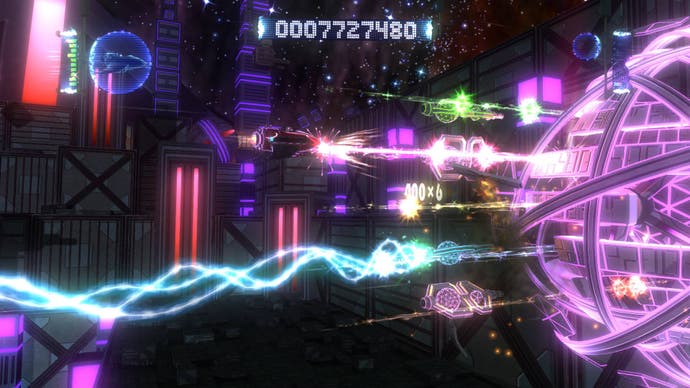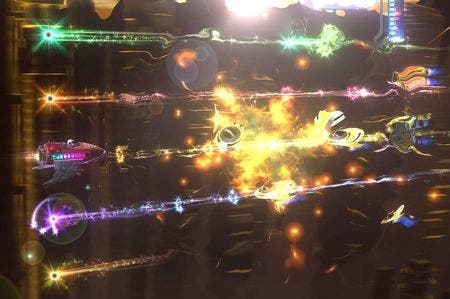Retro/Grade Review
For those about to rocket, we salute you.
Back in 2009, when Retro/Grade was nominated for two IGF awards, it probably seemed a great idea to make a game designed to be controlled with a guitar peripheral. Three years and one rather protracted development period later, it finally arrives on PSN with everyone having long since packed up their Rock Band and Guitar Hero instruments. Axe or no axe, Retro/Grade is worth playing, but I strongly recommend digging out those pieces of forgotten plastic, even if - and I'm speaking purely hypothetically here, you understand - it takes upwards of two hours to locate the wireless dongle.
Retro/Grade looks a lot like a side-scrolling shooter being played backwards, but that's only half the story. You play Rick Rocket, a pilot who must repeat his last battle in reverse in order to prevent a rift in the space-time continuum. So rather than blasting enemies apart as per tradition, bullets streak backwards from their targets to the nose of Rick's ship, whereupon you tap a button to absorb them. At the same time, you're also trying to dodge enemy bullets coming from the rear. Your ship is locked to a fixed horizontal position, and you simply move up and down to switch between colour-coded lanes, tapping and dodging all the way.

If that doesn't sound much like any shooter you've played before, that's because Retro/Grade is actually a rhythm game, with your taps timed to an insistent beat. During the earlier stages and the easier difficulty settings you'll have plenty of time to move into position, but you're soon forced to weave in and out on the off-beat, absorbing a shot then quickly avoiding another. Occasionally you'll see a Cave-like barrage of projectiles from behind and wonder how on earth you're going to avoid it, only for the waves to part at the last minute as you pass safely through the gap. All you're doing is shifting up or down at the right time, but it makes you look brilliant.
And if you do screw up, whether by gliding into a bullet or missing one of your own, you can spend some of your fuel supply to temporarily reverse the reversing and undo any mistakes. It's not particularly useful if you're going for a high score, as you'll be penalised for any fuel consumed, but it can be the difference between failing a stage and squeaking through by the skin of your teeth.
It's fun and unique, then, but it's more fun and unique still with a guitar controller, which it soon becomes clear the game has been designed around. Where before you'd move your ship with the d-pad, here you press the fret buttons to jump to the lane of the corresponding colour, and flick the strum bar to (un)fire. The colour-coding of the lanes matters less when using a regular controller, but it's essential for guitar players, and makes sense of the challenge stages which change all the lanes to the same hue. You'll probably try to fix your mistakes more often, too, simply because pressing down the whammy bar to reverse time is so strangely satisfying.
The campaign may be a mere ten songs long, but there are multiple difficulty settings to tackle, while a longer challenge mode imposes various restrictions from a reduced fuel supply to a strict no-mistake rule. Not that you'd be likely to finish it in one sitting, anyway: while the crunchy electronic soundtrack is fine, the songs follow a similar tempo and all are written in 4/4 time. Perhaps that's an unavoidable side-effect of tying such unusual mechanics to the structure of a music game, but it's a pity all the same.
Others may complain that the screen can get a little busy at times, with detailed backdrops proving a distraction from the incoming projectiles. It might even be a deliberate ploy, but at times you're forced to stare so intently at the brightly coloured projectiles that you'll start to see spots in front of your eyes when you look away.
These are minor transgressions, however. It's rare that you come across a game that dares to blend two such disparate genres, let alone one that does so expertly. If nothing else, Retro/Grade will give you a fine excuse to drag those plastic instruments out of storage for one last hurrah; a welcome reminder that, while genres may go out of fashion, good ideas never do.

